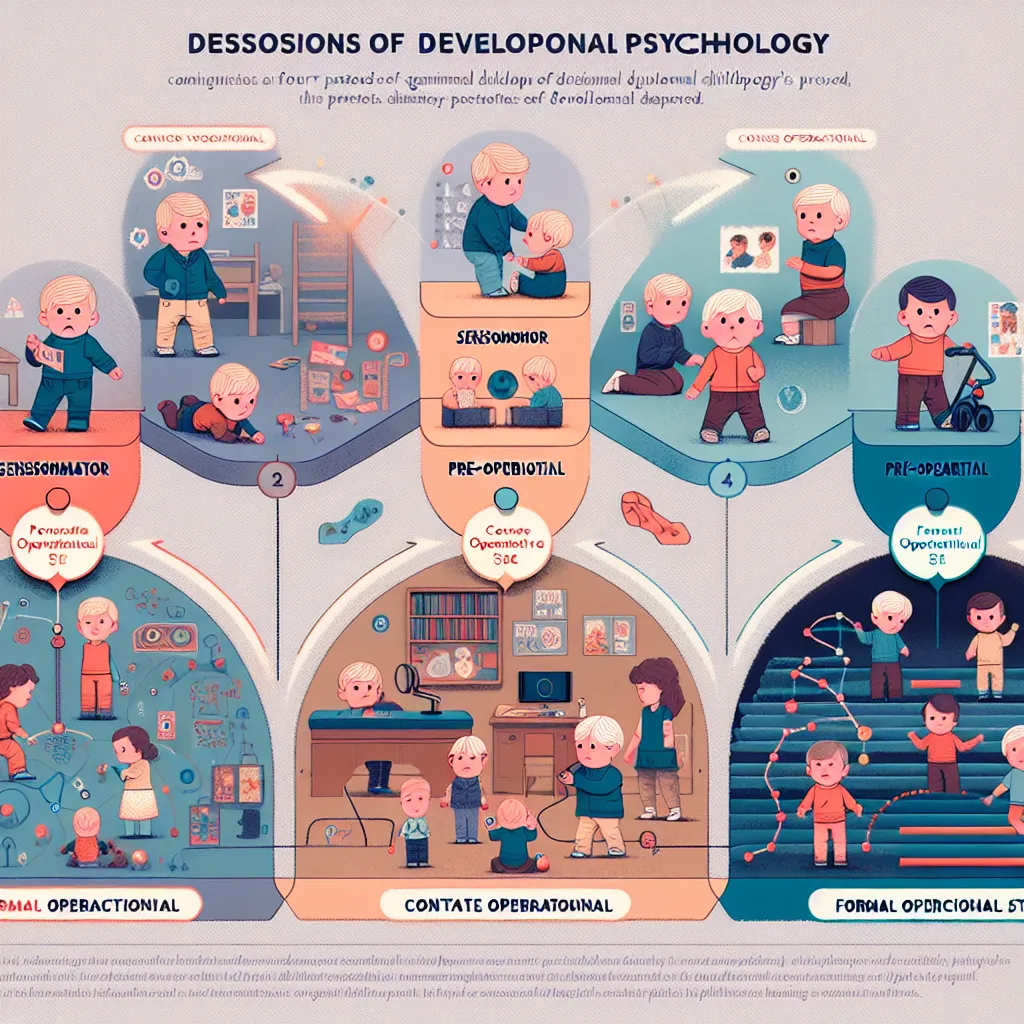Jean Piaget was a Swiss psychologist who revolutionized the field of developmental psychology with his groundbreaking theories on cognitive development in children. His contributions have had a lasting impact on how educators and psychologists understand the learning and growing process. Piaget’s work is fundamental to the study of child psychology and has been influential in shaping educational curricula around the world.
Piaget was born on August 9, 1896, in Neuchâtel, Switzerland. From an early age, he demonstrated a keen interest in biology and the natural world. However, as his career progressed, he shifted his focus to the realm of psychology, seeking to understand how knowledge is acquired. This quest led Piaget to develop his theory of cognitive development, which posits that children move through four distinct stages of mental growth.
The first stage, according to Piaget, is the Sensorimotor Stage, which occurs from birth to approximately two years of age. During this period, infants learn about the world through their sensory experiences and physical interactions. They develop an understanding of object permanence, realizing that objects continue to exist even when they are out of sight.
The second stage is the Preoperational Stage, spanning roughly two to seven years of age. At this stage, children begin to think symbolically, using language and imagination to explore their environment. However, their thinking is still very intuitive and egocentric, meaning they struggle to see perspectives different from their own.
The third stage identified by Piaget is the Concrete Operational Stage, which covers children aged seven to eleven. This is a significant period of cognitive growth, where children start to think logically about concrete events. They begin to grasp the concept of conservation, understanding that certain properties of objects, such as volume or mass, remain the same despite changes in form or appearance.
Finally, the Formal Operational Stage emerges from around twelve years of age onwards, as adolescents develop abstract thinking abilities. During this stage, they can reason systematically, think about hypothetical scenarios, and understand complex concepts and relationships.
Piaget’s theory has offered a systematic framework for examining the cognitive development of children. He emphasized the importance of a constructivist approach to learning, suggesting that children build their own knowledge through experiences and interactions with their environment. According to Piaget, teachers should provide supportive environments to nurture a child’s natural curiosity and allow them to explore and learn at their own pace.
Beyond the four stages of cognitive development, Piaget introduced several other key concepts that have had a significant influence on developmental psychology. Assimilation and accommodation, for example, are processes by which children incorporate new information into their existing cognitive structures (schemas) or adjust their schemas to account for new experiences.
Equilibration is another vital aspect of Piaget’s theory. It is the process that drives the progression from one cognitive stage to another, as children strive to balance assimilation and accommodation to achieve cognitive stability. This ongoing process of equilibration helps to explain how children advance in their thinking and problem-solving skills.
Piaget’s insights have been pivotal in understanding not just how children think, but also how they learn. His concepts have been applied to develop a variety of educational approaches that cater to children’s developmental stages. For instance, hands-on learning and discovery-based teaching methods are a direct result of Piaget’s influence, encouraging children to actively engage with their learning environment to construct their knowledge.
Though some aspects of Piaget’s theories have been critiqued or refined over the years, with researchers suggesting that cognitive development can be more continuous than staged, and that the ages at which certain abilities emerge might vary more than Piaget proposed, his foundational ideas remain highly influential.
Piaget’s contributions to developmental psychology have opened up countless avenues of research. Developmental psychologists continue to investigate cognitive development in children, inspired by Piaget’s initial findings. Moreover, Piaget’s work has instigated explorations into the roles of cultural context and social interactions in cognitive development, leading to other approaches, such as Lev Vygotsky’s sociocultural theory, which emphasizes the influence of social and cultural factors on learning processes.
Piaget’s recognition extends beyond his research papers and theories. He has also impacted the way in which standardized educational testing is developed, with his stages of cognitive development being considered when creating age-appropriate tests and assessments. Additionally, his work has informed parenting practices, supporting the notion that understanding a child’s cognitive stage can lead to more effective and empathetic communication, discipline, and encouragement.
Piaget’s contributions can also be found in the development of moral reasoning. He believed that children’s moral judgments evolve alongside their cognitive skills, eventually leading them to understand the importance of intention when assessing moral situations, as opposed to only considering the consequences of actions.
In conclusion, Jean Piaget’s extensive research and theories on cognitive development have made him a central figure in developmental psychology. His insights into how children construct understanding have significantly influenced education, parenting, and clinical practices related to child development. While subsequent research has built upon and in some cases challenged Piaget’s ideas, his legacy lives on in the rich body of knowledge and the continued exploration of the intricacies of human development. Jean Piaget’s profound understanding of the stages of children’s cognitive growth remains a cornerstone in the field of developmental psychology, offering invaluable guidance on fostering the intellectual and moral development of children throughout the world.



Leave a Comment